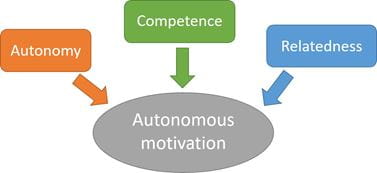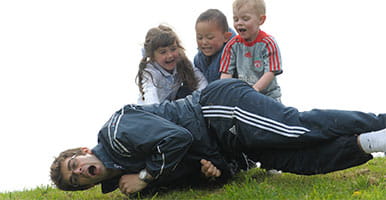Universal psychological needs

 According to SDT there are three psychological needs (autonomy, competence, relatedness) that are universally important for psychological wellbeing and autonomous motivation. You can think of these universal needs in the same way you think of physiological needs (e.g. hunger, thirst, sleep). That is - if any of these needs are not satisfied, wellbeing will suffer and motivation is likely to dip. Conversely if you feel autonomous, competent and related to others in a particular area of your life (e.g. physical activity), you are likely to feel autonomously motivated to pursue that behaviour.
According to SDT there are three psychological needs (autonomy, competence, relatedness) that are universally important for psychological wellbeing and autonomous motivation. You can think of these universal needs in the same way you think of physiological needs (e.g. hunger, thirst, sleep). That is - if any of these needs are not satisfied, wellbeing will suffer and motivation is likely to dip. Conversely if you feel autonomous, competent and related to others in a particular area of your life (e.g. physical activity), you are likely to feel autonomously motivated to pursue that behaviour.
Click on each box to read more about each psychological need:
Faq Items
Autonomy
Competence
Relatedness
Reflection
1. Think about your psychological needs in life in general. How satisfied do you feel in autonomy, competence and relatedness? What effect does it have if one or more of your psychological needs are not satisfied? e.g. if you feel like you lack control, are feeling incompetent, or not feeling loved by others. Think about the effects on both your wellbeing and your motivation.
2. Now think of a hobby you do regularly (perhaps it is some kind of physical activity, arts/crafts or cooking). How satisfied do you feel in autonomy, competence and relatedness with respect to this specific activity? i.e. to what extent do you feel this activity is determined by you, how capable do you feel, and how much support do you feel you have from others around you? What is it that makes you feel this way?
Satisfying needs in the context of child weight
How might a needs-satisfied parent/carer feel?
Autonomy - Parent/carer feels it is they who has made the decision to become healthier. They feel they have some control and choice over their behaviours (rather than simply going through the motions because someone else has told them to).
Competence - Parent/carer feels they have the skills and resources required to become healthier. For example, they feel the physical activity plan they have set is realistic and they have the skills and knowledge to make the dietary changes required. They might draw on previous successes to enhance their belief that they can change.
Relatedness - Parent/carer feels they are connected to and supported by others to change their family’s lifestyle behaviours. These others may be friends, family members or professionals and support may be emotional or practical. Essentially, they feel like people care and are supportive of what they are doing.
What if a parent/carer's needs for autonomy, competence and relatedness aren’t satisfied?
Parents/carers whose needs aren’t satisfied may have low self-esteem, appear unmotivated or express a lack of control over their current situation.
As well as considering your own role in supporting a parent/carer's psychological needs, it is important to consider other people or areas of their lives that may have an influence (e.g. partner/family, home environment).
Sometimes others can behave in a way that suppresses an individual’s psychological needs. For example a family member saying there is nothing wrong with a child, it’s puppy fat, they have a big appetite etc., or saying negative comments about an individual’s efforts to change, or that they are not capable of achieving change.
If a parent/carer is struggling to change their lifestyle behaviours, consider other influences that might be affecting their autonomy, competence or relatedness. Look out for signs that they may be experiencing pressure from their family, partner or friends. Can you talk to them about how this makes them feel, and what they could do to manage the situation?
Case study - Nicola (home life)
In the example below, consider how satisfied Nicola’s psychological needs are in relation to the physical activity and diet of her children? What factors may be affecting her feelings of autonomy, competence and relatedness?
Nicola is a single mother with three boys aged 10, 5 and 3 years. She lives in a council flat on the 10th floor in a local tower block. Nicola used to work in a local supermarket but since having the children, she has had to give up work because she can’t fit it in around taking her children to school and looking after her 3-year old.
Nicola’s children are fussy eaters so she tends to give them things they like (e.g. white bread, chips, chicken nuggets). Often these foods are cheaper too. When the family are at home the children watch TV most of the time because there is nothing else to do. They’ve got lots of friends in the neighbourhood but they’re all in the same situation, so the children just tend to go and watch TV or play on X-boxes at each others’ houses.



